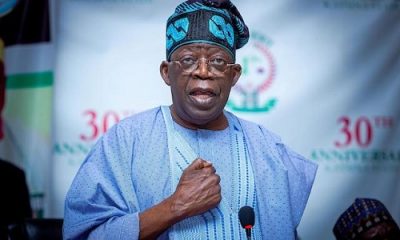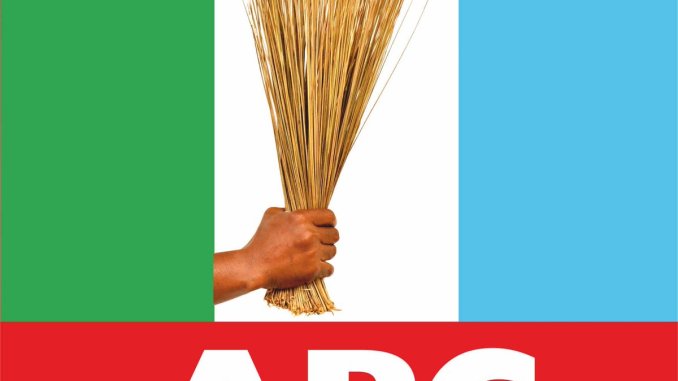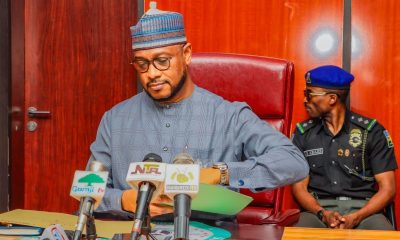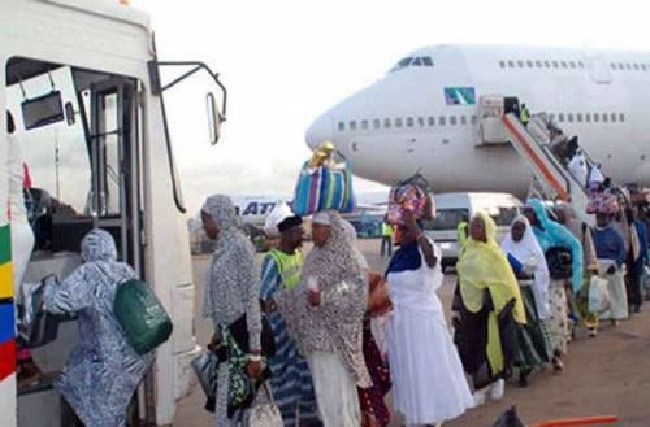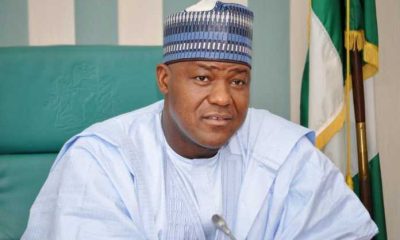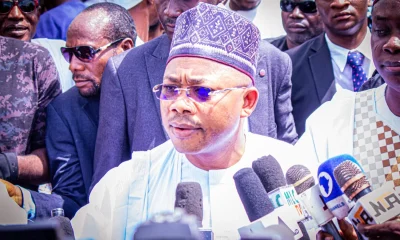OPINION
Nigeria and the Next National Assembly

By Ebun-Olu Adegboruwa
Come June 13, 2023 or thereabout, the leadership of the National Assembly will be up for a change, the present set having been elected on June 11, 2019, with Ahmed Lawan (APC) and Femi Gbajabiamila (APC) in charge as President of the Senate and Speaker of the House of Representatives respectively.
They were anointed to take over the leadership of the National Assembly in 2015 following the victory of their political party at the general elections, but that was not to be, as certain influential members of the APC lobbied the opposition lawmakers to upset the applecart, thus throwing forward Bukola Saraki and Yakubu Dogara as leaders instead.
The lobbying in the present dispensation has been very intense, with all manner of permutations and calculations, from zoning to merit, being bandied to canvass support for certain interests. Some have posited that zoning, faith and gender should play major roles in the recruitment process, given the composition of the leadership of the major political parties.
Deliberately and without mincing words, the framers of the Constitution established the Legislature as the First Arm of government, because law is needed to define all other aspects of human existence.
It is thus expected that through its additional powers of approval and oversight functions, the legislature will work to curb the excesses of the executive arm of government, especially in situations where retired politicians have hijacked the democratic process, having in their prime tasted power and are not unwilling to hand over to others. These factors have shot the legislature into national focus, especially the leadership.
The National Assembly is a bicameral legislature consisting of 109 members of the Senate and 360 members of the House of Representatives, modelled after the federal Congress of the United States and meant to guarantee equal representation. In the current 9th National Assembly, the APC has 66 seats in the Senate, PDP 38, NNPP 1 and YPP 1 whilst in the House of Representatives, the APC has 227 seats, PDP 121, APGA 4, NNPP 3, ADC 1 and PRP 1.
Three seats are vacant in the Senate while one seat is vacant in the House of Representatives. In the 10th National Assembly that will be inaugurated in June, APC has 59 senators, PDP 36, LP 8, SDP 2 NNPP 2, APGA 1 and YPP 1. In this composition, the ruling party has 59 senators whilst the opposition parties altogether have 50, which gives renewed strength for diversity. In the House of Representatives, the APC has 162 seats, PDP 102, LP 34, NNPP 18, APGA 4, ADC 2, SDP 2 and YPP 1.
What this has shown is that it is not possible for the ruling party to foist any candidate upon the National Assembly, even though the same scenario played out in the 9th Assembly with the opposition parties unable to pull their weight when it mattered most.
Notwithstanding the seeming plurality of representation, the 9th National Assembly has not been able to assert itself as an autonomous institution, preferring rather to treasure political party affiliation over and above the national interest. In that dispensation, the executive arm of government was always certain of maximum support and approval of all proposals and requests, no matter how unpopular, injurious or backward. In the jurisdiction for which our legislative arm has been patterned, there is the robust system of separation of powers and the doctrine of checks and balances.
The three arms of government are expected to operate independently and complimentarily, not dependent upon or patronizing, in the manner that the 9th Assembly has carried on. No doubt it is good to have a responsible legislature for the purpose of harmonization and development but when it gets to the level where the executive is always right, then such level of dubious cooperation should worry all lovers of true democracy.
A legislature that cannot supervise and check the excesses of the executive is not worth its name at all. Truth is, such an assembly of persons cannot claim to represent anyone, when the chips are down. They represent only themselves, only their interests and their stomachs. However, the 9th Asssembly was able to conclude the process of the amendment of the Constitution and it also gave us the new Electoral Act, with all its booby traps.
Owing largely to the independent mode of its leadership recruitment, the 8th National Assembly under Saraki and Dogara turned out to be one of the best ever, at least in taming the monstrous executive arm. You can imagine what would have happened under Saraki should the Central Bank of Nigeria dream of the calamitous project of Naira redesign or the needless loans that the federal government has embarked upon in its dying days.
It was not business as usual in the National Assembly under Saraki and Dogara, as the legislators asserted their powers to the fullest and held the executive down to follow due process, at all times. As an appointee of the President, you would have to prepare very well for your screening, and ministries and other government agencies had to sit up to defend their budgets and actions.
They were very daring, courageous and they took steps to protect the people from an overbearing executive. It was little wonder then that the ruling party did all its best to ensure that most members of that collective did not return to the 9th National Assembly. But Nigeria has paid dearly for that selfish agenda as the 9th National Assembly operated more like a weeping institution, a clearing house and a reporting Chamber, where elected representatives of the people stoop to beg directors of parastatals to attend public hearings, at times issuing empty threats without any follow-up action and granting virtually all the requests of the executive. Having succeeded in installing its cronies in positions of authority at the National Assembly, the executive has since then embarked upon mindless borrowings, putting our nation at the mercy of shylock imperialists, who whimsically drafted contracts that threaten even our cherished sovereignty, at times in their own language. Yes, it is a National Assembly that prides itself in ‘reporting’ errant serving ministers and heads of parastatals who defy its summons, to the President.
As elected representatives of the people, the National Assembly is expected to assert the will of the people by invoking the relevant provisions of the constitution in the discharge of their statutory responsibilities of law making, supervising the executive arm and also to prevent waste and corruption.
Lawmakers who scramble for constituency projects cannot be in the best position to make laws that will impact the people positively. So much has been invested in the National Assembly in order to guarantee optimum performance and so the leadership of such a crucial organ should not be a matter of political patronage or reward for perceived electoral support.
We cannot afford the misfortune of parading elected representatives who are whipped along the lines of executive preferences, all the time. There has to be a balance of power and of forces, for our nation to ever dream of attaining the expected growth that our leaders have touted so often.
In choosing the leadership of the 10th National Assembly therefore, the most important criteria should be competence, which can also include experience, qualification and indeed reputation.
As the saying goes, the fish gets rotten from the head, so the kind of leaders to be entrusted with the management of the National Assembly is key to our national development. Of course we need to be sensitive to issues of gender parity, faith and indeed zoning, all of which could be accommodated in the primary consideration of merit as indeed it is possible for the right candidate to possess all these features all at once. Although the tradition is for the ranking members-elect of the political party with the highest number to produce the leadership of the National Assembly, it does not have to be along party lines, given that the laws governing the choice of leadership is internal to the legislature.
For instance, the opposition parties, either in the name of “the Greater Majority” or any other forum, can swing the tide if they remain united. In this regard, legislators should be allowed to vote according to their convictions, not vote buying.
The news filtering that certain candidates for the leadership are campaigning with dollars to garner support should be a disqualifying factor, if at all it is true. Security agencies should beam their searchlight on the members-elect to monitor their activities, especially their finances.
We cannot afford to reduce the next leadership of the National Assembly to commercial ventures to be sold to the highest bidders, as once corruption has been laid upon the foundation of that hallowed institution, then we can all predict what would happen in the next four years.
Members-elect are thus enjoined to discountenance the APC contraption of leadership by zoning. I vote for an independent, vibrant and active National Assembly.
Adegboruwa, a Senior Advocate of Nigeria (SAN), writes from Lagos
OPINION
Nigeria’s Security: Between Self-defence and Community Policing

By Mukhtar Ya’u Madobi
As Nigeria continues to battle worsening security challenges — ranging from banditry and kidnapping to terrorism, insurgency, and communal violence — citizens across the country are increasingly embracing grassroots security measures and calls for self-defence.
These challenges are not confined to the North. In the South, militancy, piracy, secessionist agitations, cultism, and cybercrimes further complicate the nation’s fragile security landscape. Speaking at the maiden annual lecture of the National Association of the Institute for Security Studies, themed “Mobilising Stakeholders to Curb Insecurity in Nigeria: A Practical Approach,” the Director-General of the State Security Service (SSS), Oluwatosin Ajayi, stressed the need for communities to take greater responsibility for their own security. He cited examples where local populations had historically repelled insurgents and urged communities to work closely with security agencies to counter threats such as terrorism, banditry, and kidnapping.Ajayi noted that it is unrealistic to expect security agencies to protect every citizen across Nigeria’s expansive territory. He argued that communities must serve as the first line of defence, and that empowering them would enhance grassroots resilience, while reducing over-reliance on federal forces.Echoing this position, former Chief of Defence Staff, General TY Danjuma (rtd), recently renewed his longstanding call for Nigerians to rise in self-defence against non-state actors. Reacting to fresh waves of violence in Plateau, Benue, and other states, Danjuma insisted that citizens can no longer afford to remain passive while bandits and terrorists wreak havoc.“The warning I gave years ago remains valid. Nigerians must rise and defend themselves. The government alone cannot protect us,” he said.This message of self-defence has increasingly resonated across vulnerable communities, reflecting the harsh reality of an overstretched security system that leaves millions exposed. The roots of the crisis lie in decades of state neglect, porous borders, weak intelligence systems, and economic exclusion.In the North-West, states such as Zamfara, Katsina, and Kaduna are under the siege of bandits, who raid villages, rustle livestock, extort ransoms, and impose levies. In the North-Central region, particularly Plateau and Benue states, farmer-herder conflicts have morphed into sustained ethno-religious violence. The South-East contends with secessionist violence linked to IPOB/ESN elements, who often target security infrastructure. Meanwhile, the South-West and South-South struggle with cultism, ritual killings, and piracy.One chilling episode was the abduction of more than 280 schoolchildren in Kuriga, Kaduna State, in March 2024. Although the children were eventually rescued, the incident laid bare the glaring weaknesses in Nigeria’s security infrastructure and left the community traumatised.Faced with these realities, several states have begun taking their destinies into their hands. In April, the Kano State Government passed the Security Neighbourhood Watch Law to create a legal framework for community-led security efforts. Katsina has trained local vigilantes through its Community Watch Corps, while in Zamfara, Governor Dauda Lawal launched the Community Protection Guards (CPG), a controversial but welcomed initiative in rural areas long neglected by formal forces.In the North-East, the Civilian Joint Task Force (CJTF) continues to support military efforts against Boko Haram, leveraging local knowledge and swift response capabilities. The Amotekun Corps in the South-West, headquartered in Ondo State, has addressed critical security gaps in the region, earning both criticism and praise. Similarly, the South-East’s Ebube Agu and joint regional outfits in the South-South emerged from the growing public distrust in the federal government’s ability to guarantee safety.However, the growing wave of self-defence and vigilante initiatives raises ethical, legal, and practical concerns. Nigeria’s Firearms Act prohibits civilians from bearing arms without a licence. Without a clear regulatory framework, arming civilians risks escalating violence, enabling political thuggery, and creating new security threats under the guise of protection.These dangers are not hypothetical. In Edo State’s Uromi community, vigilantes wrongfully accused 16 Northern hunters of being kidnappers and burnt them alive. In July 2022, Ebube Agu operatives reportedly killed 14 unarmed wedding guests in Otulu, Imo State. Other vigilante groups in the region have been implicated in extrajudicial killings and abuses. A Daily Trust investigation in April revealed that vigilante groups killed at least 68 people in three months, with many more subjected to torture, harassment, or unlawful detention.These developments have prompted the House of Representatives Committee on Army to call for the regulation, oversight, and training of vigilante groups. The Uromi killings, in particular, triggered national outrage and renewed demands for accountability.Responding to these concerns, Major General Chris Olukolade (rtd), chairman of the Centre for Crisis Communication, acknowledged General Danjuma’s fears but cautioned against unregulated civilian self-defence. He warned that unless communities are engaged within a structured and legal framework, insecurity may only worsen. According to him, civilians should not be armed unless integrated into formal security systems with clear guidelines.Against this backdrop, community policing has emerged as a more sustainable and coordinated alternative. Under the leadership of the Inspector General of Police, pilot schemes have been launched across several states. These involve recruiting and training locals for surveillance, intelligence gathering, and early intervention, followed by their integration into existing police structures.Lagos, Ekiti, and Kano States have all recorded notable progress. In Kano, the Hisbah Corps, initially tasked with moral enforcement, has been reoriented to contribute to broader urban security. In Lagos, the Neighbourhood Safety Corps plays a vital role in gathering intelligence and issuing early warnings.Nonetheless, community policing faces serious limitations. Funding shortfalls, inter-agency rivalries, and a lack of coordination continue to undermine its effectiveness. A major stumbling block is the constitutional contradiction where state governors are designated as chief security officers but lack control over federal police operations within their jurisdictions.Solving Nigeria’s security crisis requires a comprehensive strategy that addresses institutional, legal, and socio-economic issues. First, the constitution must be amended to empower state and community policing structures with defined jurisdictions and robust oversight. Second, vigilante and self-defence groups must be trained, regulated, and integrated into the formal security architecture to avoid becoming a threat themselves. Third, intelligence gathering should begin at the grassroots, where community members are often the first to notice early warning signs. Fourth, addressing the root causes of insecurity — such as unemployment, poverty, and youth disenfranchisement — through investments in education, job creation, and social empowerment is essential. Lastly, traditional and religious leaders must be given formal roles in mediation, peacebuilding, and community-based conflict resolution, given their influence and trust within local populations.Nigeria’s security challenges demand more than rhetoric and reactive responses. While the instinct to defend oneself is natural in the face of government failure, unregulated self-defence is a risky and unsustainable path. The lasting solution lies in creating a decentralised, community-driven security model rooted in legality, ethics, and shared responsibility.As communities across the country face mounting threats, the question is no longer whether to adopt localised security strategies — but how best to coordinate, empower, and regulate them before chaos becomes the norm.Mukhtar Ya’u Madobi is a research fellow at the Centre for Crisis Communication. He can be reached via ymukhtar944@gmail.com.
OPINION
This Trial of Oloyede
By Tunde Akanni
It’s been traumatic for my entire family since that video started making the rounds. I sneaked a slight view… It’s our trial. It’s my trial. Oloyede is genuine. He is most sincere. He is modestly so, as well. For us, however, Allah knows best.
I was with a trader in the afternoon of what I considered a dark Wednesday, the 14th of May. “Se bi won ni JAMB o get mo bayi…”. I had to cut in immediately. Which JAMB? “Madam, that’s one person I will vouch, and vouch for…zero tolerance for corruption. Absolutely responsible with a high level of consciousness for the good of others. If certain things went wrong at JAMB, I agree it’s his responsibility to carry all pleasant and other burdens but just know that the bad side of the operations may as well be sabotage. I have absolute trust in that man. Ask my own colleagues about me, but Oloyede is my own hero, somebody I have known for more than 40 years…”This is by no means a reductionist disposition to the tragedy induced by the so-called computer glitch. May the Almighty God in His infinite mercy console the parents of the candidate reported to have committed suicide. May God strengthen them to survive this gloomy phase of their lives and sustain them to reap bountiful compensation that will endure in their lives. It’s hard, so hard to pull tragedies of this magnitude. I personally feel for these parents.The said computer glitch, may we never fall victim to it. Those who work for big organisations requiring a large layout of ICT operations know what I’m talking about. Rather than being ‘solutional’, IT facilities can be unimaginably problematic sometimes, yet indispensable in this civilisational dispensation. This is not doubting deliberate sabotage, as may have happened in the case of JAMB. I’ve been part of Oloyede’s JAMB journey to attest to his commitment to offer his best for the otherwise sinking board.Far from being cosmetically exhibitionist, the Oloyede-led JAMB team, led by the Education minister, Tunji Alausa, went round the critical facilities of JAMB during the just concluded examination. Alausa saw, firsthand, like never before elsewhere in this country, how far JAMB had gone in its strive for transparency and the real-time monitoring of the conduct of examinations nationwide. Alausa, beyond being in awe, sought to make the JAMB effect spread immediately to other examination bodies.No be dem say, same day, the WAEC team came to JAMB and made it into the situation room, which was my own duty post. The NECO team followed suit afterwards, both duly led around by the sturdy lead IT consultant who’s been reliably there from Oloyede’s assumption of duty, Damilola Bamiro. Far richer, given that they charge more for their exams, the duo of WAEC and NECO were suddenly mandated to understudy the examination sector leader in Africa that JAMB has become over time.The staff of both WAEC and NECO suddenly had to undertake a professional excursion led through all the real time monitoring screens and other digital facilities. It was obvious they marvelled at what they saw, revealing a functional leader-subordinate synergy manifest with trendy output that the world can see and learn from.But that may even seem like the tip of the iceberg of the output of the hard work and commitment of the nation’s foremost icon of integrity in public service. A series of far more seemingly serious strides had been accomplished by Oloyede at JAMB. As a focused scholar, he keeps ensuring that every bit of the experience of the Board is treasured as worthy data to guide future actions and even subjects for further research.Not even the agencies dedicated to emergency matters in Nigeria could have been as prompt as the Oloyede management on this ugly glitch saga. Once the complainants began ventilating into the public space, JAMB rose to the challenge without any predictably traditional arrogant stance of government is always right. I was aware that a particularly strident public critic and a former students’ leader at Obafemi Awolowo University, Adeola Soetan commended the spokesperson for JAMB for the excellent handling of public complaints.Promptly, an independent team of investigators was set up to unravel the mystery leading to the rather depressing situation that now confronts us. The team, drawn from assorted but technically relevant constituencies, has found out that no fewer than 165 centres of over 800 examination centres nationwide were affected.Obviously well prepared for whatever the outcome may turn out to be, he braced up to the challenge to embrace the surrender value to tell it to the world as it is. This trial is for all of us who believe and trust Oloyede. I am in this group. So much so that his public cry infected me…It was a patriot’s cry for his beloved country. Like me, a former Law don at LASU, Dr Kilani wasn’t any less affected as demonstrated in a quick note to me: “I write to associate myself with the pain, sorrow and emotion of our own Professor Oloyede. I could not hold my tears seeing him cry. May Almighty Allah see him through. May we all not be put to shame…”But then came a soothing message from Gbade Osunsoko, my cousin: “…He will come out of this much stronger because Nigerians will trust him far better than a number of our leaders.. A man that makes mistakes happens under him and takes responsibility – it’s a big deal in Nigeria.”With Oloyede, young Nigerians with challenges regarding sight are no longer left to moan their fate endlessly, with adequate provision for their inclusion in the UTME. How many of our public facilities are this inclusion conscious as stipulated by SDGs? How come a legacy built through almost a decade at the very best cost ever possible will be made to crumble when the game changer leader remains ever modest? JAMB has steadily risen through thick and thin to accomplish its tasks to the admiration of stakeholders, nationally and internationally, under Oloyede. Both NNPC and the Nigeria Police, being beneficiaries, can attest to the current competence of JAMB. How many other numerous stakeholders nationwide never deemed to have any relevance to JAMB before Oloyede but have since become critical, if not indispensable players?But why does this sudden saddening encounter threaten our joy of service without blemish? Why this unforeseen truncation of a good story, so intentional, coming from Africa? Whodunnit? Surely the truth shall come out for the world to perceive and assess and get to appreciate the efforts and the quantum of commitment appropriated to the JAMB excellence project driven by Oloyede.One cannot but be deeply concerned. Before the very eyes of a few of us carefully selected to give support from our respective professional perspectives from the very beginning, Professor Oloyede’s concern for genuine growth and development was real. It is still real and increasingly so, as a matter of fact. Indeed, inimitable. It shall be well.Tunde Akanni is a professor of Journalism and Development Communications at the Lagos State University, LASU. Follow him on X:@AkintundeAkanniOPINION
Democracy, Institutions, and the Rule of Law

By Kator Ifyalem
Democracy, often hailed as the cornerstone of modern governance, is a system that empowers citizens to participate in the decision-making processes that shape their lives. However, the mere existence of elections is not enough to ensure a fair, just, and prosperous society.
Without robust institutions, the rule of law, and ingrained values, democracy can become a hollow shell, susceptible to corruption, manipulation, and eventual collapse. At its core, democracy is built on the principle that power resides with the people. This power is exercised through fair elections, where citizens choose representatives to govern on their behalf. The effectiveness of this system relies heavily on the strength of supporting institutions, adherence to the rule of law, and shared values that guide societal behaviour.Institutions serve as the backbone of a democratic society, translating the will of the people into action. These include governmental bodies such as the legislature, executive, and judiciary, as well as independent organizations like electoral commissions, anti-corruption agencies, and human rights commissions. These institutions provide checks and balances, ensuring that no single entity or individual can accumulate too much power. They create a framework for accountability, transparency, and effective governance.An independent judiciary is crucial for upholding the constitution and protecting individual rights. Without it, laws can be manipulated or ignored by those in power, leading to tyranny. Similarly, a free and independent media acts as a watchdog, informing citizens and holding those in power accountable. When media institutions are weakened or controlled by vested interests, the flow of information is compromised, and citizens are unable to make informed decisions.The rule of law is another critical component of a functioning democracy. It ensures that all citizens, regardless of their status or position, are subject to the same laws and legal processes. This principle is fundamental to creating a fair and just society where everyone’s rights are protected. A robust legal framework, consistently and fairly enforced, provides the predictability and security necessary for social and economic development. It protects property rights, enforces contracts, and creates an environment conducive to investment and growth.Moreover, the rule of law is essential for protecting minority rights and preventing the tyranny of the majority. In a true democracy, the rights of all citizens must be respected, even if they are not part of the ruling majority. This protection is enshrined in laws and enforced through effective legal institutions.Values form the third pillar of an effective democracy. These shared beliefs and principles guide societal behaviour and inform policy-making. Democratic values include respect for human rights, tolerance of diversity, commitment to justice, and belief in the equality of all citizens. When these values are deeply ingrained, they act as a safeguard against authoritarian tendencies and help preserve the integrity of democratic institutions.For instance, a healthy democracy can be likened to a three-legged stool, where institutions, the rule of law, and democratic values form the legs. Just as a stool cannot stand stably without all three legs being strong and balanced, a democracy cannot function effectively if any of these elements is weak or missing. In Nigeria’s case, we’ve seen how weaknesses in one area, such as institutional challenges in election management, can put stress on the other legs, requiring the judiciary (rule of law) and civil society (democratic values) to bear more weight to maintain stability.Education plays a crucial role in instilling these values. A well-informed citizenry, aware of their rights and responsibilities, is better equipped to participate meaningfully in the democratic process. Civic education programs that teach the principles of democracy, the importance of institutions, and the value of the rule of law are essential for creating engaged and responsible citizens.The interplay between institutions, the rule of law, and values creates a self-reinforcing cycle that strengthens democracy. However, this cycle can also work in reverse. Weak institutions often lead to a breakdown in the rule of law, eroding democratic values and further weakening the system. This negative spiral will ultimately lead to the collapse of governance, even if the outward trappings of democracy remain.To prevent this decline, concerted effort is required on multiple fronts. Institutional capacity must be built and maintained through adequate funding, training, and support. The rule of law must be consistently enforced, with mechanisms in place to address corruption and abuse of power. This requires not only strong legal frameworks but also a commitment to their implementation.International cooperation also plays a role in strengthening democracy. Countries learn from each other’s experiences, share best practices, and provide support for development. However, it’s crucial to recognize that democracy cannot be imposed from outside; it must be nurtured from within.True democracy requires more than just the act of voting; it demands a comprehensive system of governance that respects the rights of all citizens, upholds justice, and promotes the common good. Strengthening these fundamental pillars (institutions, the rule of law, and values), is crucial in building more resilient, effective, and truly representative democracies that serve the needs of all citizens and contribute to global stability and prosperity. Where does Nigeria as a nation stand on this scale?
